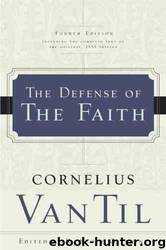The Defense of the Faith by Cornelius Van Til

Author:Cornelius Van Til
Language: eng
Format: mobi, azw3
Tags: apologetics
ISBN: 9780875526447
Publisher: P&R Publishing
Published: 2008-04-01T00:00:00+00:00
* * *
Special And General Revelation
Torch and Trumpet
1952
Volume 2, Issue 2. Pages 5–8
* * *
We are concerned in this series of articles with the problem of Reformed apologetics. In the first three articles we discussed the general nature of Reformed apologetics. Its method, we saw, is radically different from that of Romanist-evangelical apologetics. The latter starts from the presupposition that man has a measure of ultimacy or autonomy. This method assumes therefore that man can correctly interpret an area of life without referring to the God of the Bible. Over against this Reformed apologetics contends that man himself must first be interpreted in terms of the Bible before he can, without falsification, interpret any area of life.
The Bible
In the fourth and fifth articles we dealt with the Bible itself. Reformed theology holds that Scripture speaks for itself. The sort of God of which the Bible speaks cannot speak otherwise than with absolute authority. The biblical notion of God as self-contained or self-sufficient and the notion that the Bible is self-authenticating are involved in one another.
This simple foundation truth of Protestantism is virtually rejected by evangelical Protestants.
Evangelicals make a two-fold charge against the Reformed doctrine of Scripture. On the one hand they say that it is irrationalistic. We saw how Carnell sets up the autonomous or "rational man" as a judge before whom the Bible must prove its right to speak with authority. This is as though a child were sitting in judgment on its parents, graciously permitting these parents to speak to it with authority.
On the other hand evangelicals say that the Reformed doctrine of Scripture is rationalistic. We saw how Pieper, the Lutheran, sets up the autonomous man as judge over the contents of the Bible. He insists that inasmuch as the Bible teaches the "freedom" of man it can and must also teach the doctrine of a changing God who adjusts himself to the ultimate decisions of man.
The Autonomous Man
On the surface it seems strange that the Reformed doctrine of Scripture should be charged both with irrationalism and with rationalism. And on the surface it also seems strange that the two seemingly exclusive charges spring from the same source, namely, from evangelicalism. Yet there is really nothing else that we could expect from evangelicalism. The root error of evangelicalism, as noted earlier, is its ascription of a measure of ultimacy to man. This partly ultimate man only claims its "rights" when it charges the idea of the absolute, self-authenticating authority of Scripture with irrationalism, and when it charges the idea of the absolute, self-consistent God with rationalism.
Evangelical Compromise
Of course the evangelical, Mr. Grey, has the best of intentions in all this. He wants to win Mr. Black, the non-believer, to an acceptance of the Bible as God's Word and to an acceptance of the God of the Bible as his God. But Mr. Black has his conditions. Hard-pressed though he is, he none the less is not ready, he says, to consider the idea of an unconditional surrender, such as Mr.
Download
The Defense of the Faith by Cornelius Van Til.azw3
This site does not store any files on its server. We only index and link to content provided by other sites. Please contact the content providers to delete copyright contents if any and email us, we'll remove relevant links or contents immediately.
The Secret Power of Speaking God's Word by Joyce Meyer(3128)
Signature in the Cell: DNA and the Evidence for Intelligent Design by Stephen C. Meyer(3111)
Real Sex by Lauren F. Winner(2996)
The Holy Spirit by Billy Graham(2927)
The Gnostic Gospels by Pagels Elaine(2514)
Jesus by Paul Johnson(2347)
Devil, The by Almond Philip C(2317)
23:27 by H. L. Roberts(2235)
The Nativity by Geza Vermes(2217)
Chosen by God by R. C. Sproul(2147)
All Things New by John Eldredge(2145)
Angels of God: The Bible, the Church and the Heavenly Hosts by Mike Aquilina(1948)
The Return of the Gods by Erich von Daniken(1920)
Angels by Billy Graham(1913)
Knowing God by J.I. Packer(1841)
Jesus of Nazareth by Joseph Ratzinger(1795)
The Gnostic Gospel of St. Thomas by Tau Malachi(1777)
Evidence of the Afterlife by Jeffrey Long(1772)
How To Be Born Again by Billy Graham(1769)
